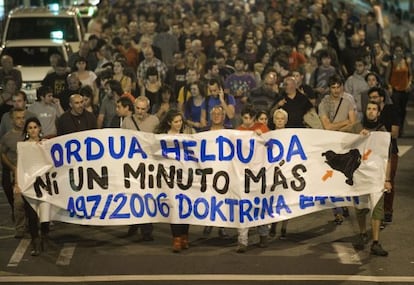Two years into ceasefire, Basque left sees new hope for final settlement
'Abertzale' groups have been at loggerheads with ETA over how to manage peace


Sunday marked the second anniversary of the definitive cessation of armed activities by the Basque terrorist group ETA. The date was observed against the backdrop of a renewed confrontation between ETA and Sortu, the party born in February 2011 out of the ashes of ETA's outlawed political wing Batasuna. In a break with its predecessor, Sortu has publicly rejected the use of violence for political means.
The confrontation is caused by ETA's refusal to bow to calls for disarmament, or to agree with its convicted members applying for penitentiary benefits on an individual basis, which requires a prior declaration of repentance. This, despite entreaties by the Basque parties and even radical nationalist circles for ETA to relax its strict rules on this latter issue.
This situation also coincides with the most important milestone on the road to consolidating the end of terrorism: the Strasbourg ruling on the so-called "Parot doctrine." The party spokesman Pernando Barrena said the Strasbourg ruling should be understood as "an opportunity for a new policy of peace."
By rejecting this legal method of preventing early release for criminals with long convictions, the European Court of Human Rights may help release as many as a quarter of ETA's most veteran prisoners in the short term. This might in turn unblock the impasse between ETA and Sortu. Two years' worth of penitentiary policy that made no concessions to ETA - not even to its old demand of getting prisoners transferred to centers closer to home - finally made a dent on relations between the terrorist group and pro-independence radicals (known collectively as the abertzale left).
Basque parties are unanimous that ETA must take unilateral steps
Meanwhile, on September 27 ETA issued another statement warning that it will never admit to the damage and pain it has caused during its 40 years of terrorism, resulting in over 800 deaths. Bildu, another coalition of radical nationalist parties, is forecasting a protracted disarmament process.
Part of the trouble lies in the fact that when ETA announced its definitive ceasefire two years ago, the abertzale left immediately encouraged high expectations for a rapid "solution" for the 600 terrorists serving time in Spanish prisons - by which it mostly meant getting them all transferred to penitentiaries in the Basque Country, instead of being spread all over Spain. But in all that time the conservative government of Prime Minister Mariano Rajoy has failed to connect with ETA or soften up its penitentiary policy to adapt to "the new times," as the mainstream Basque Nationalist Party (PNV) and the Basque Socialists had asked it to.
Instead, the Popular Party government is demanding that ETA turn in its weapons, officially disband, and that its prisoners apply for rehabilitation on an individual basis. Although the PNV and the Basque Socialists accept that ETA's definitive ceasefire was a unilateral move, they nevertheless say the central government should make legal concessions to its prisoners.
So far, the only experiment in flexibilization approved by the executive - the release of Josu Uribetxeberria Bolinaga, an ETA convict with terminal cancer, in the summer of 2012 - triggered such a wave of rejection from the political right and its media outlets that Rajoy decided to make no more such moves.
Town shows the way ahead
José Manuel Herzog, a councilor for the conservative Popular Party (PP) in the Basque town of Renteria - where as many as 30 people were killed by ETA during the "Years of Lead" - recently said that it was important to "overcome the spirit of revenge because the feelings of spite by the defeated get passed down from generation to generation."
Herzog is part of a local government team whose mayor belongs to Bildu, the heir to Batasuna (ETA's outlawed political wing); this team is trying to overcome old confrontations.
The Renteria experience is both a symbol and proof that Basque society is moving faster than governments and political parties on the issue of peaceful coexistence. This has also been noticed by foreign visitors who lived in the Basque Country during the bloodiest years of ETA attacks.
Basque society is seeing how ETA has stopped short of turning in its weapons and disbanding altogether; nor has the central government made any moves on the penitentiary front. The solution, ultimately, might lie in what Renteria embodies: a pact among political parties doing day-to-day groundwork.
Bildu is also being accused by its own sympathizers of lacking a clear strategy. Its only response to the blocked situation has been three large street demonstrations that had no effects beyond their media impact. They did not create enough social pressure for the PNV and the Basque Socialists to challenge the executive.
Meanwhile, frustration levels inside the prisons have been rising. Some prisoners have said they are feeling abandoned by Bildu members who have reached power at the local and provincial level following elections. There have even been cases of internal confrontation between ETA prisoners who support applying for benefits and those who prefer to remain loyal to ETA codes of conduct.
Also, Bildu's management of many towns on issues such as trash collection and bullfighting has met with rejection from part of Basque society, as well as from within its own ranks.
And so this absence of clear solutions for ETA prisoners, coupled with a lack of strategy and leadership by Bildu in the municipalities under its control, has created renewed tension between the terrorist group and the abertzale left.
Basque parties unanimously agree that ETA must break this impasse by taking more unilateral steps, even if the central government refuses to sit down to talks. The recent decision by the Strasbourg court favoring the release of long-term convicts could be just the kind of stimulus that ETA needs.
In any case, the abertzale left will try to manage this prisoner release with prudence; it knows that Madrid will be watching closely for any public tributes to terrorism, a crime that could create new roadblocks for the implementation of the Strasbourg decision.
But the two years that have elapsed since ETA's announcement show that the ceasefire is irreversible, if only because the group is exhausted, and because of the abertzale left's official rejection of terrorism as the way forward. The elimination of the Parot doctrine could thus help the Basque Country advance toward peaceful coexistence, as long as the new situation is properly managed by the central government and by the Basque radical left.
Tu suscripción se está usando en otro dispositivo
¿Quieres añadir otro usuario a tu suscripción?
Si continúas leyendo en este dispositivo, no se podrá leer en el otro.
FlechaTu suscripción se está usando en otro dispositivo y solo puedes acceder a EL PAÍS desde un dispositivo a la vez.
Si quieres compartir tu cuenta, cambia tu suscripción a la modalidad Premium, así podrás añadir otro usuario. Cada uno accederá con su propia cuenta de email, lo que os permitirá personalizar vuestra experiencia en EL PAÍS.
¿Tienes una suscripción de empresa? Accede aquí para contratar más cuentas.
En el caso de no saber quién está usando tu cuenta, te recomendamos cambiar tu contraseña aquí.
Si decides continuar compartiendo tu cuenta, este mensaje se mostrará en tu dispositivo y en el de la otra persona que está usando tu cuenta de forma indefinida, afectando a tu experiencia de lectura. Puedes consultar aquí los términos y condiciones de la suscripción digital.








































